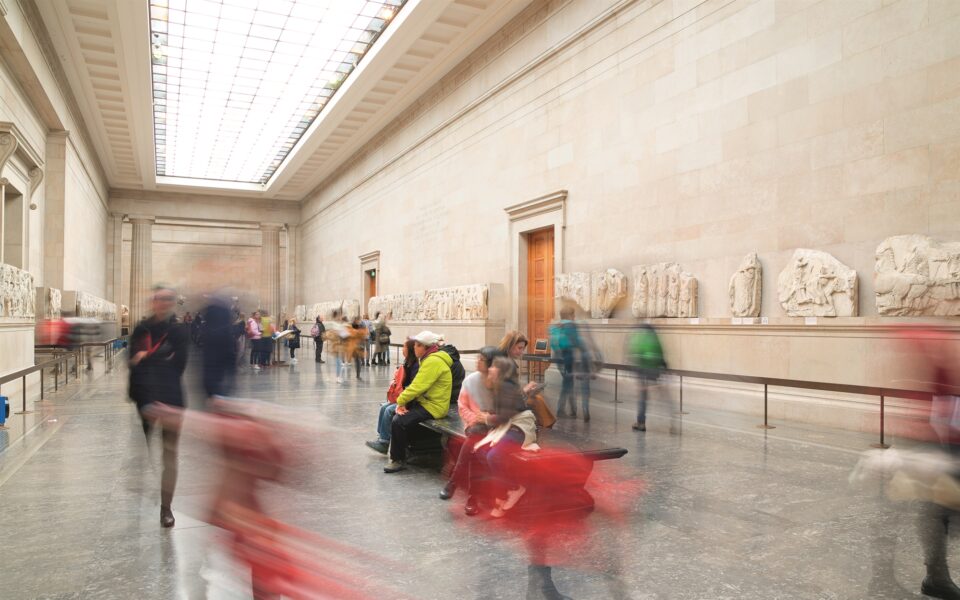Where now for the Parthenon Sculptures? We ask the experts

In late November 2023, the Financial Times wrote in an extensive story on a subject that has not been without more than its fair share of leaks these past few years, that Sir Keir Starmer, head of what was then the main opposition Labour Party, was “open” to an agreement for the return of the Parthenon Sculptures to Greece.
To be precise, the newspaper quoted a person close to Starmer as saying that “we’re sticking with the existing law, but if a loan deal that is mutually acceptable to the British Museum and the Greek government can be agreed, we won’t stand in the way.”
The reference to a “loan deal” (which Greece refuses to discuss) and the clarification that “we’re sticking with the existing law” (meaning the 1963 British Museum Act, which prohibits the British Museum from selling or giving part of its collection to another institution or country) dampened the mood in Greece, but did not extinguish hopes of a breakthrough. The comments had come from the environment of the leader of a party where previous leaders – like Jeremy Corbyn and Neil Kinnock – had been positively predisposed to Greek demands. In the meantime, public opinion polls in the UK in late 2023 pointed to the 61-year-old center-left lawyer as being the country’s “prime minister in waiting.” And since his position on a possible reunification of the Parthenon Sculptures had been published just days before then British prime minister Rishi Sunak’s decision to cancel a meeting with his Greek counterpart, Kyriakos Mitsotakis, in response to comments by the latter on the subject of the marble artifacts, it was reasonable to assume that, in contrast to the Conservatives, Labour was at the very least more flexible on the issue.
So what happens now that Starmer has been elected prime minister and Sunak has quit the Conservative Party leadership after a crushing defeat in the July 4 polls? What can Greece expect? A slight shift in British policy on the return of antiquities, perhaps? A change at the government level that would facilitate the ongoing negotiations between Athens and the British Museum, and its chair George Osborne? Or none of the above?
“The UK’s new prime minister, Sir Keir Starmer, has a simply vast majority in the House of Commons, so that in principle, if it was the Labour Party’s official policy to do so, the 1963 Museums Act could be either repealed or modified and the Parthenon Marbles in the British Museum could begin the process of repatriation and reunification quite soon,” Paul Cartledge, professor emeritus of Greek culture at the University of Oxford and vice chair of the British Committee for the Reunification of the Parthenon Marbles (BCRPM), tells Kathimerini.
However, he adds, “The electoral manifesto of the Labour Party was disappointingly light on any cultural commitments whatsoever, let alone any consideration of future international cultural diplomacy. At first sight therefore, we should not expect any positive initiative from this new Labour government any time soon.”
Cartledge says that there are a few MPs who “openly favor reunification, and the cause of reunification is attracting ever growing support outside Parliament, but it is going to require some extraordinary and exceptional international contingency or emergency for this new Labour government to consider the marbles to be an issue of such importance electorally as to be worth devoting valuable parliamentary legislative time and effort to it.”
He adds that the UK’s new culture secretary, Lisa Nandy, “is not on record as showing any interest at all in the Parthenon Marbles question ever. But we of BCRPM will of course be holding her feet to the fire as soon as we are able, once the new government’s honeymoon period is over.”
Another member of the respected BCRPM, author Victoria Hislop, who recently published “The Figurine,” also notes that Nandy, who has “an absurdly broad remit,” has not openly stated a position on the matter of the reunification of the Parthenon Sculptures. Nevertheless, there is cause for guarded optimism, she says, “because it has had more support from Labour MPs than those of other parties over the last four decades, so this feels potentially positive for those who believe the sculptures currently housed in the British Museum should be returned to Athens.” The acclaimed writer also points to the increasingly positive stance of the British public on the matter, saying that “if our new government is one that listens to the electorate, they could do worse than bring this to the top of the agenda.”
Hislop argues that while amending the 1963 law “sounds so simple,” the Labour Party’s pre-election program did not make any reference to the issue, so “we should not get overexcited.”
‘The 1963 Museums Act could be either repealed or modified and the Parthenon Marbles could begin the process of repatriation quite soon’
As Kathimerini has written before, Greece has seen other Labour governments in the past which appeared positively predisposed to its demands for reunification, but fell short of doing anything about it. The Greek side has not forgotten this fact, but it is not indifferent to the Financial Times’ revelations last November either.
According to Greek Culture Minister Lina Mendoni, the government has made a positive evaluation of the positions expressed in the paper, believing that they “create a climate of favorable neutrality, in a way.” However, “it remains to be seen whether they will have practical implications.”
“In any case, our policy, strategy and red lines do not change depending on the changes in government in Britain,” she adds.
Mendoni argues that more progress has been made on the issue in the past five years than in previous decades, since Greece’s claim was dynamically brought to the fore in 1982 by her predecessor, Melina Mercouri. The tools of bilateral and international cultural diplomacy and every relevant international forum are regularly exploited by the Greek side, while surveys have indicated that nearly 70% of the global public is in favor of Pheidias’ masterpieces returning to their proper place under the Attic sun.
“Given that the overwhelming majority of British public opinion and even traditional conservative media outlets like The Times are now unreservedly aligned with the Greek demand, the British government will have to give it serious consideration,” says the minister.
What do legal experts, who have a completely different approach to the matter, have to say, though?
“Keir Starmer knew exactly what he was saying when he stated, via an associate, that ‘if a loan deal that is mutually acceptable to the British Museum and the Greek government can be agreed, we won’t stand in the way,’” argues Irene Stamatoudi, a law professor at the University of Nicosia. “First of all, because he knew that he was ahead of Rishi Sunak and would soon be called on to govern and to keep his promises, and second, because having served as director of public prosecutions and knowing the law as a human rights lawyer, he knows how much latitude there is in British legislation on this matter. However, it would be a mistake to see Starmer’s positive stance as a commitment to resolve the matter.”
Achieving a deal will not be easy, Stamatoudi notes, especially since the two sides are talking about different things: Greece wants the sculptures returned, while Britain is exploring the possibility of a loan.
“A fresh opportunity will arise on July 18, when the British government hosts the European Political Community (EPC) summit at Blenheim Palace, bringing together around 50 leaders from all over Europe. This meeting represents a perfect opportunity for the Greek prime minister to raise the issue with his British counterpart, even though it seems that the channels of communication with the British Museum and its chairman, George Osborne, are still open. Starmer will not take the initiative to do something as a matter of principle. He will allow the British Museum and its chairman to run point, but the power of a political nudge is not negligible – though it should not be overrated,” says Stamatoudi.
The most optimistic view of developments seems to come from the Parthenon Project, an organization that campaigns for the reunification of the sculptures with the help of a win-win solution.
“The Labour Party has done the right thing by saying that they wouldn’t get in the way of negotiations between the British Museum and the Greek government. This paves the way for an ambitious and wide-ranging solution, and I am confident that both sides will find a way forward,” the organization’s chairman, Lord Ed Vaizey, tells Kathimerini.
Source: ekathimerini.com




